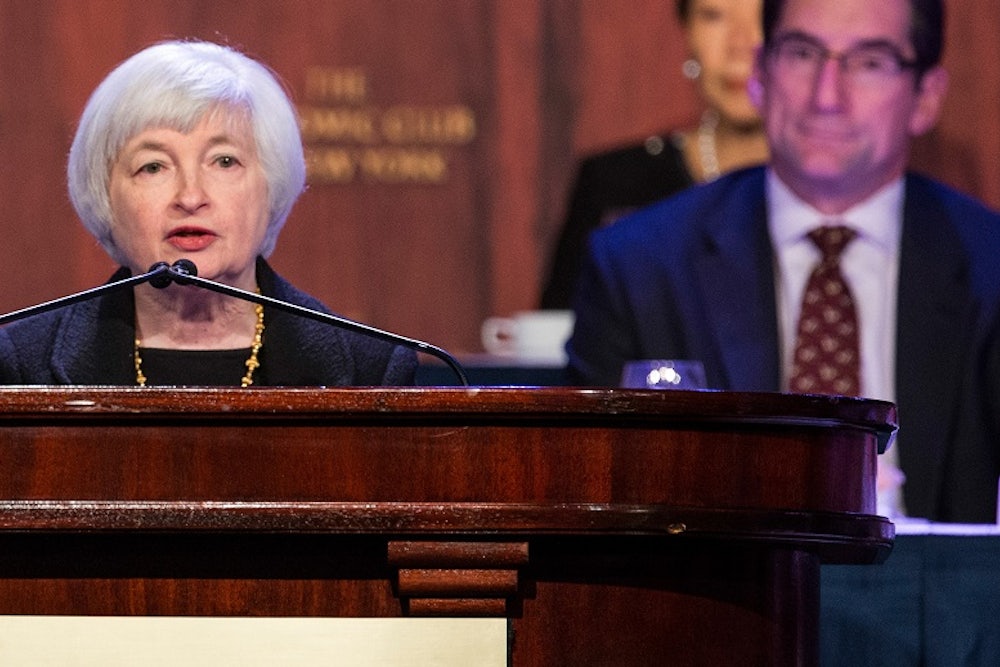If you’ve been out of work for more than six months—that is, if you’re among the “long-term unemployed”— the start of 2014 has been awfully dispiriting. You lost your unemployment benefits in late December. The economy hasn’t taken off. Jobs continue to be scarce. And despite all of this, policymakers, including President Barack Obama, have offered few targeted measures to help get you back to work.
But you do have one, very powerful champion: Janet Yellen.
In two separate speeches over the past three weeks, the newly installed chairperson of the Federal Reserve has laid out her position on the huge debate happening right now inside economic circles on the tightness of the labor market. Her response has made it abundantly clear that she is on the side of Main Street, particularly the long-term unemployed.
Long-term unemployment is a national crisis. Republicans blocked an extension of long-term unemployment benefits in December and have continued to do so throughout 2014. Conservatives supporting this move theorized that, without benefits, the unemployed would accept jobs and the number of long-term unemployed would decrease. That has not happened. Instead, the long-term unemployed have found themselves in a double-bind: They are looking for a work in a job market that actively discriminates against them, but they’re no longer receiving support from the federal government. It’s bad for the economy, which loses the contributions of these would-be workers, and of course it’s bad for the individuals struggling to get by.
The question at the center of the economic debate has been whether, as the recovery continues, employers will finally start hiring the long-term unemployed. One tell-tale sign will be what happens with wages. If they grow over the next year, that’s a sign that employers are paying workers more because they are competing for scarce labor—something unnecessary if firms are actually willing to hire the long-term unemployed. But if wages don’t grow quickly, that means employers aren’t having trouble filling jobs—and thus are hiring the long-term unemployed.
This is where the Fed comes into the picture. It’s been trying to boost the recovery, and the labor market, using tools like quantitative easing. But within the Fed, there’s always been a divide over the best policy course—and on one side are conservative economists who worry that inflation is lurking in the near future. (These people are known as “inflation hawks.”) Once wages start to pick up even a little bit, they’ll lobby for tighter monetary policy. If that happened, the best-case scenario would be to choke off wage growth, something American workers very much need. The worst case would be to cut off employment opportunities for the long-term unemployed.
If Yellen’s speeches are indicative of the Fed’s policy strategy, she’s not about to let that happen. Speaking in Chicago late last month, Yellen said, “[W]e have not yet seen clear indications that the short-term unemployed are finding it increasingly easier to find work relative to the long-term unemployed. This fact gives me hope that a significant share of the long-term unemployed will ultimately benefit from a stronger labor market.” On Wednesday afternoon in New York, Yellen reiterated that view. “There is ongoing debate about why long-term unemployment remains high and the degree to which it might decline in a more robust economy,” she said. “As I argued more fully in a recent speech, I believe that long-term unemployment might fall appreciably if economic conditions were stronger.
“[E]conomists also look to wage pressure to signal a tightening labor market,” she added. “At present, wage gains continue to proceed at a historically slow pace in this recovery, with few signs of a broad-based acceleration.”
The significance is easy to miss, if you don’t follow economics closely. She’s basically saying that, as the recovery continues, employers will begin hiring the long-term unemployed. In a nutshell, she’s saying the inflation hawks are wrong and that, until circumstances change, she’s not inclined to follow their advice. That’s important and, if you care about the long-term unemployed, a welcome sign. Congress doesn’t seem interested in helping these people and the president doesn’t seem able. But the Fed may be able to make a difference and Yellen isn’t going to let that chance pass by.
